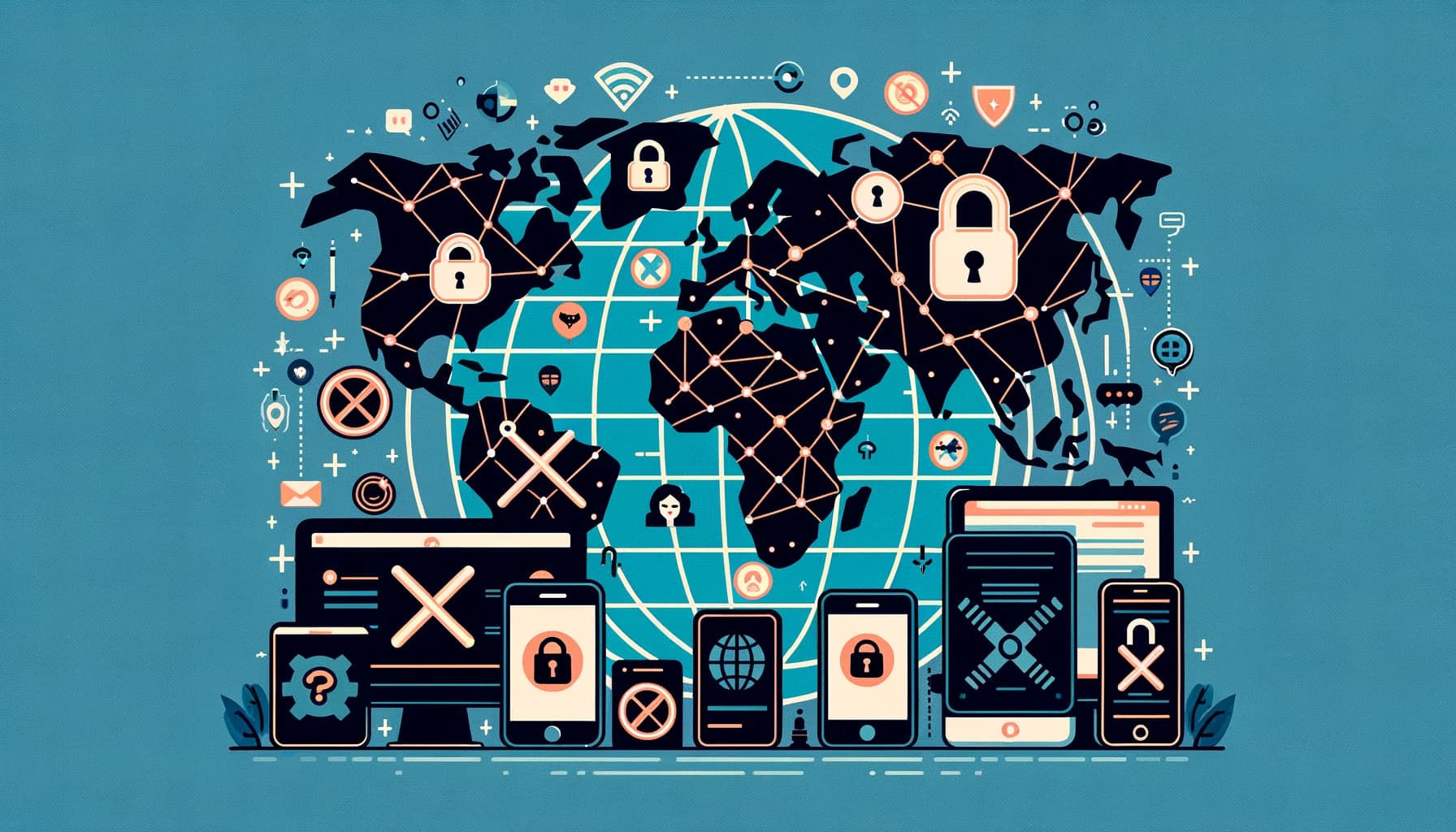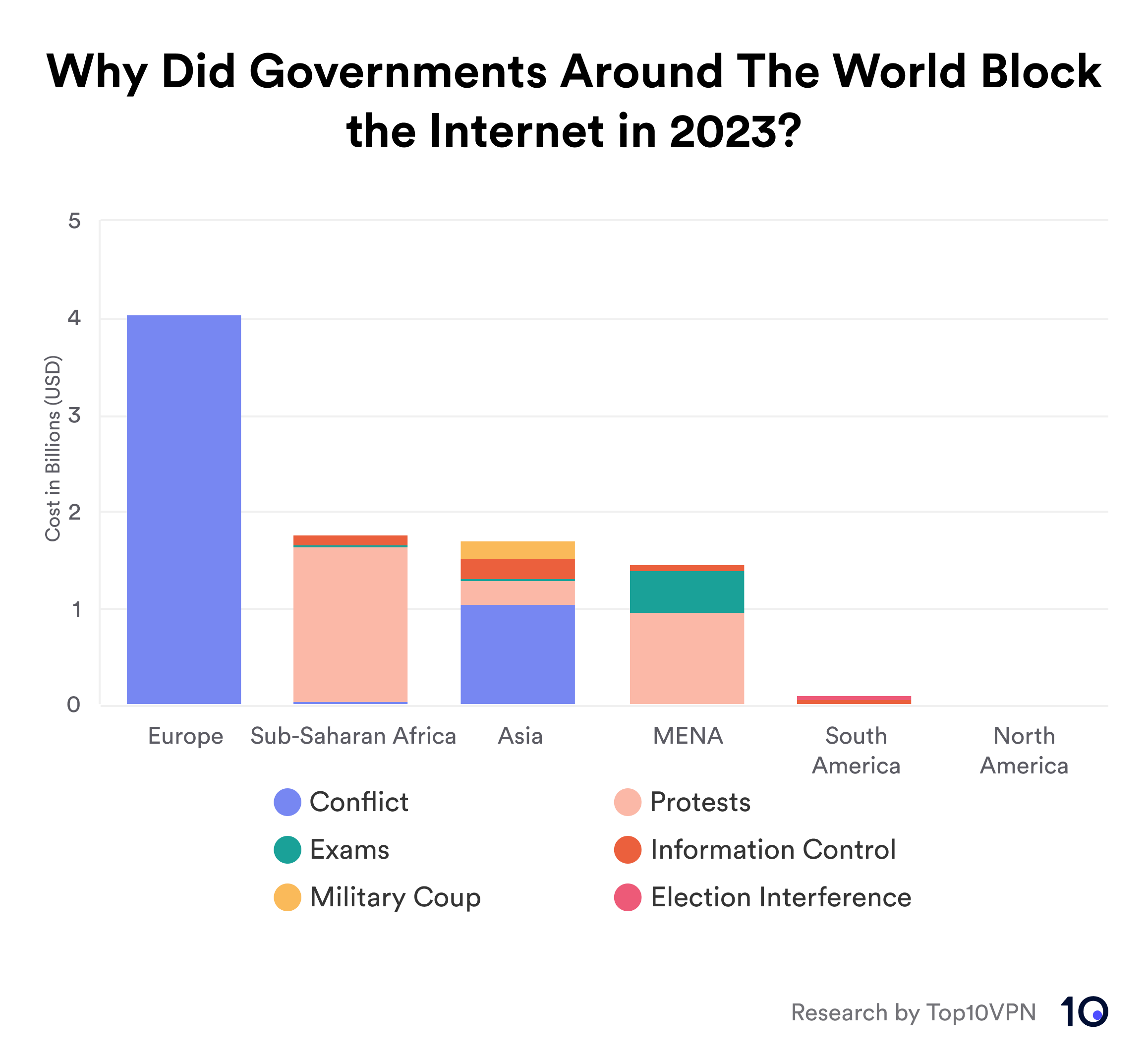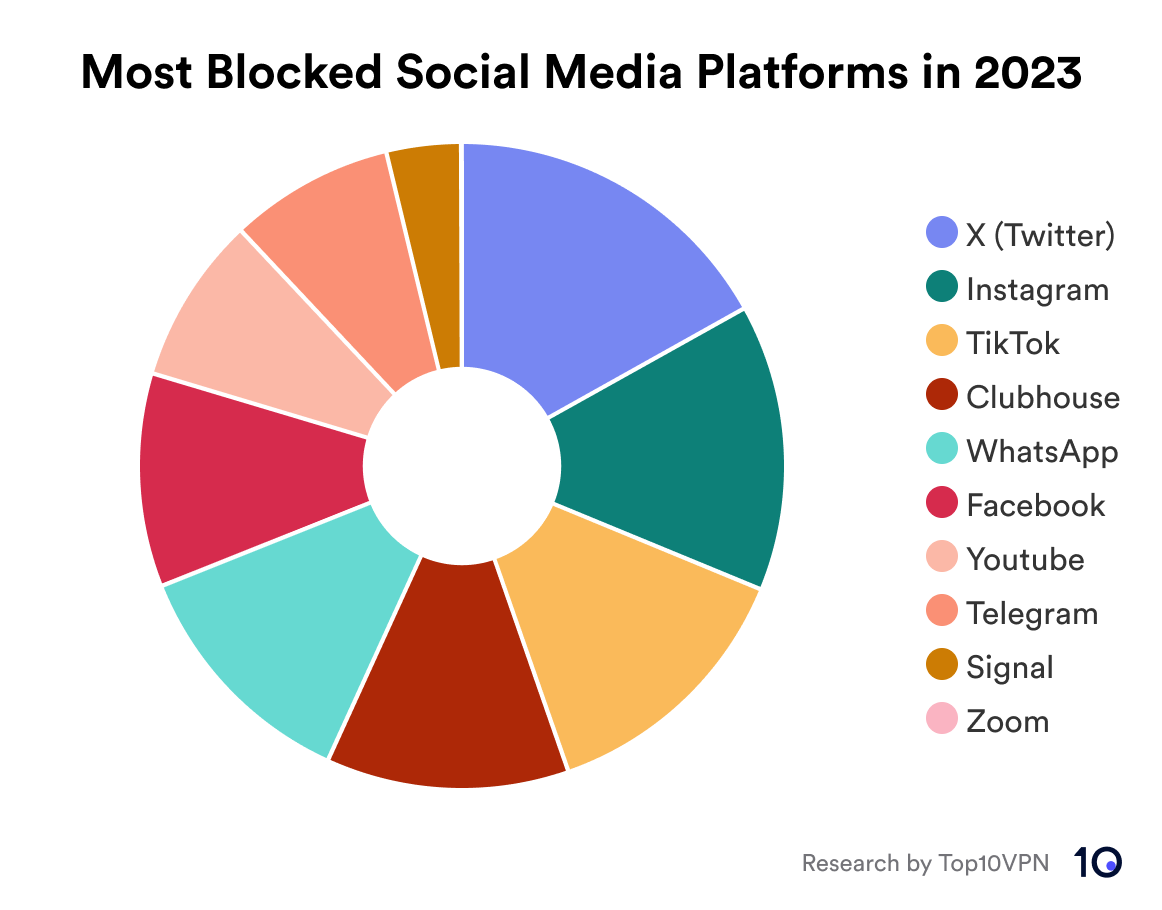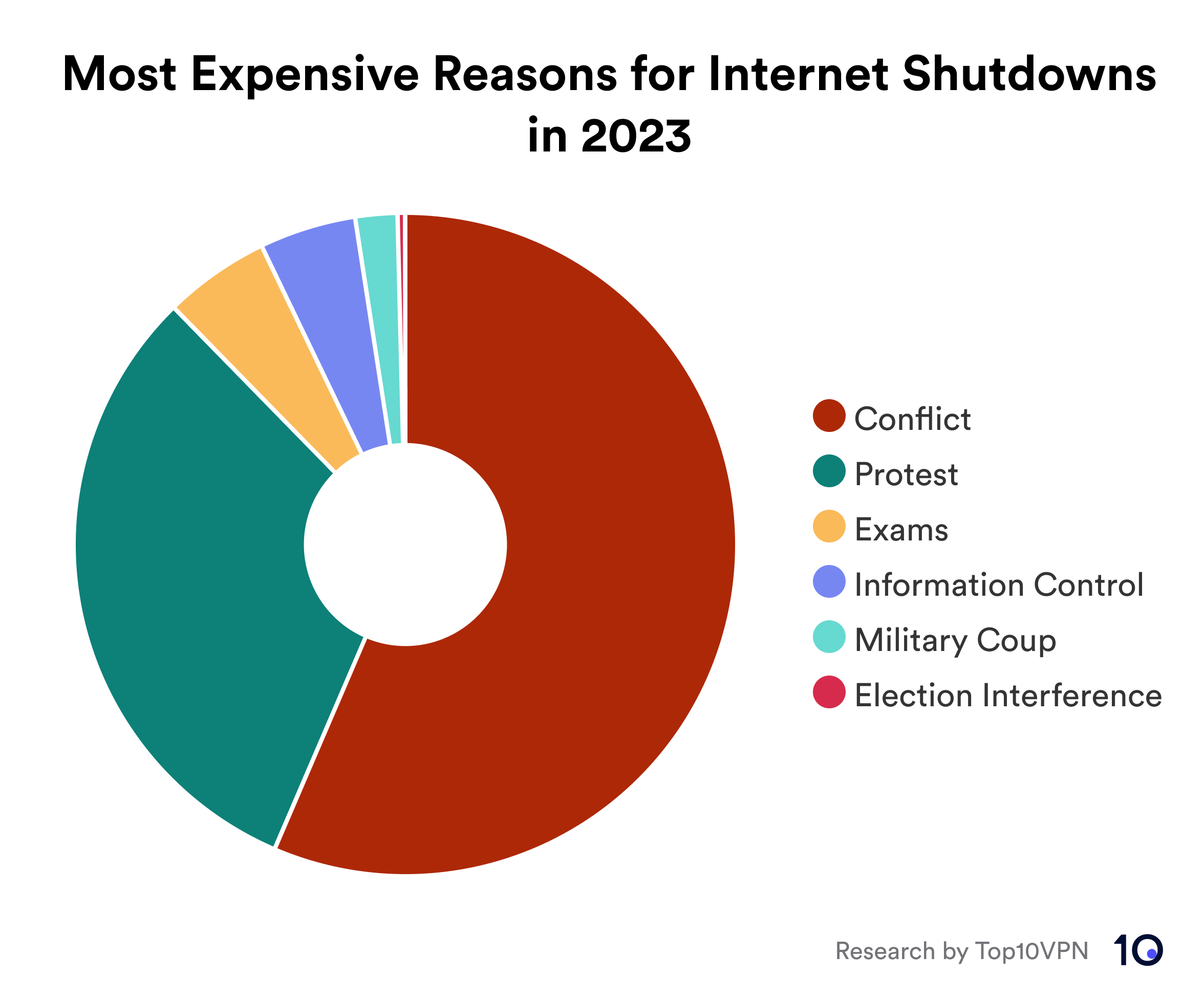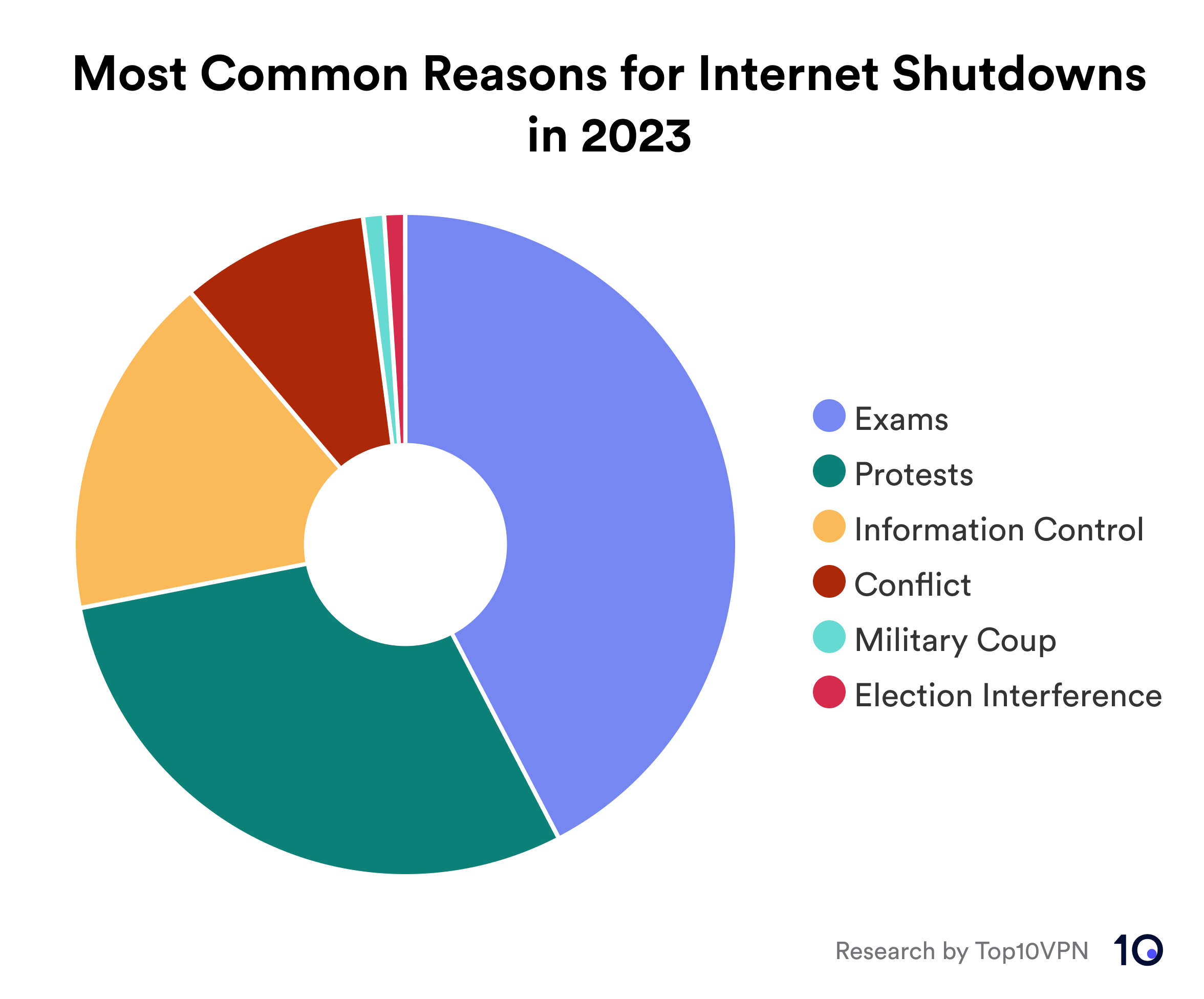This section of the report examines the circumstances around each instance of governments cutting or restricting internet access.
We have looked at each country individually and broken out the duration of each type of internet outage. We have also identified the nature of any additional human rights abuses associated with the government internet outages.
Countries are ordered and grouped according to the overall economic impact of their government’s internet restrictions over the course of 2023.
Use the following links to jump straight to the relevant country-by-country section:
Countries with Internet Shutdown Costs Over $500 Million
Russia
- Social media shutdown: 1,353 hours
- Total cost of internet restrictions: $4.02 billion
- Human rights abuses: Right to peaceful assembly, freedom of press
The Russian ban on Instagram, Facebook and X (Twitter) was first implemented in February 2022 and continued into 2023. Although we stopped including the economic impact of these restrictions in our calculations after February 2023, a year after they were first put into place, this shutdown remained the most expensive one across the world, costing over $4 billion in 2023 alone.
Ethiopia
- Internet blackout: 3,414 hours
- Social media shutdown: 11,496 hours
- Total cost of internet restrictions: $1.59 billion
- Human rights abuses: Right to peaceful assembly
Access to Facebook, YouTube, Telegram and TikTok was restricted by authorities in Ethiopia due to religious tensions.[1] The blocks were implemented in early February and would not be lifted until over five months later in July. Demand for VPN services peaked at 3,651% higher than average following the start of the restrictions.
Ethiopian authorities imposed an internet blackout in the northern region of Amhara in early August in response to escalating tensions with local militia.[2] Although internet connectivity has been partially restored since November, restrictions in the region remain.
Myanmar
- Internet blackout: 10,008 hours
- Social media shutdown: 8,760 hours
- Total cost of internet restrictions: $974 million
- Human rights abuses: Right to peaceful assembly, election interference, freedom of press
Authorities in Myanmar continued to restrict access to X (Twitter) for a third year following the coup in 2021. The social media platform was only accessible around half of the time.
Long-running regional internet blackouts continued in as many as 42 townships in the Chin, Kachin, Kayah, Magway and Mandalay states. Kachin state was the most recently affected, with the entire region disconnected from the internet since early November. [3]
Iran
- Internet blackout: 516 hours
- Social media shutdown: 12,624 hours
- Total cost of internet restrictions: $920.3 million
- Human rights abuses: Right to peaceful assembly
The Iranian government first blocked Instagram and WhatsApp in September 2022 in response to widespread demonstrations following the death in custody of Mahsa Amini. While these social media restrictions were still ongoing at the time of publication, we have only considered their economic impact up until September this year. In 2023 alone, this social media blockade had an economic impact of over $907 million.
Authorities also continued to impose weekly internet blackouts every Friday in Zahedan, in Iran’s south east.
India
- Internet blackout: 7,812 hours
- Social media shutdown: 144 hours
- Total cost of internet restrictions: $585.4 million
- Human rights abuses: Right to peaceful assembly, freedom of press
India imposed 30 major internet shutdowns in 2023. As in previous years, these internet outages were highly localized to specific districts, cities and even villages, and tended to be in response to civil unrest, often preemptively. For the purposes of this report we only included internet restrictions that imposed on larger population zones.
The most significant internet outage in India took place in Manipur, in the country’s north east. Local authorities imposed over 5,000 hours of internet blackouts this year in the region, restricting internet access almost continuously from May to December. The restrictions were a response to ethnic tensions in the area.[4]
Although social media shutdowns are much less common in India than elsewhere in the world, authorities in the state of Bihar blocked multiple social media platforms in April following clashes during a religious festival.
Countries with Internet Shutdown Costs of $100 – $500 Million
Iraq
- Internet blackout: 185 hours
- Social media shutdown: 280 hours
- Total cost of internet restrictions: $328.5 million
Iraq implemented 66 internet outages on its citizens in 2023, more than any other country in the world. Almost every one of these disruptions was related to school exams. The restrictions began as social media shutdowns, with Facebook, Instagram, WhatsApp, X (Twitter) and YouTube all blocked for 8 hours at a time throughout February. In June and September, authorities instead instigated short internet blackouts of up to 4 hours’ duration.
Internet outages were also imposed in the northern region of Kurdistan in June and August, supposedly to prevent cheating in exams.
Access to Telegram was also restricted by authorities in August, citing concerns for personal data violations.[5] The use of the messaging platform was restored a little over a week later, however VPN demand in the country remained 72% higher than normal following the restrictions.
Pakistan
- Internet blackout: 96 hours
- Social media shutdown: 163 hours
- Total cost of internet restrictions: $237.6 million
- Human rights abuses: Right to peaceful assembly
Internet access was blocked for 4 days in Pakistan in May following the public outcry over the arrest of former Prime Minister Imran Khan.[6] Access to X (Twitter), Facebook and YouTube was also restricted.
Demand for VPN services in the country surged following these restrictions, peaking at 1,329% higher than normal.
Algeria
- Internet blackout: 50 hours
- Total cost of internet restrictions: $101.9 million
Algerian authorities cut access to the internet nationwide 5 times in June, for 10 hours each time. The restrictions were part of harsh measures to combat exam cheating.
Countries with Internet Shutdown Costs of $10 – $100 Million
Senegal
- Internet blackout: 135 hours
- Social media shutdown: 3,811 hours
- Total cost of internet restrictions: $57.4 million
- Human rights abuses: Right to peaceful assembly
Senegal experienced a number of internet blackouts and social media shutdowns from June through August.
Multiple social media platforms were blocked nationwide at the start of June in response to widespread protests, followed by a series of four internet blackouts in the following days. The restrictions resulted in an over 60,000% rise in demand for VPN services, the largest increase we have ever recorded.
A second series of daily restrictions on mobile internet access took place in late July and early August, following the arrest of the opposition leader.
Azerbaijan
- Internet blackout: 2,487 hours
- Social media shutdown: 1,008 hours
- Total cost of internet restrictions: $52.3 million
- Human rights abuses: Right to peaceful assembly
Internet access was cut in September in the disputed Nagorno-Karabakh region by Azerbaijani authorities and has yet to be restored.
Access to TikTok in the region was also restricted until November 1st.
Guinea
- Social media shutdown: 3,720 hours
- Total cost of internet restrictions: $47.4 million
- Human rights abuses: Right to peaceful assembly
The Guinea government restricted access to Facebook, WhatsApp and Instagram for three days in May ahead of planned protests.[7]
These social media platforms, along with YouTube and Telegram, were again restricted in late November. At the time of publication, authorities in Guinea had yet to make any statement about why they continued to block social media in the country, along with several TV and radio outlets.[8]
Brazil
- Social media shutdown: 48 hours
- Total cost of internet restrictions: $46.2 million
Telegram was blocked in April by order of the court in Brazil after the messaging platform refused to supply user data on far-right groups.
Access to the messaging service was eventually restored, however demand for VPN services in the country surged, peaking at 192% higher than normal on the day Telegram was blocked.
Mauritania
- Internet blackout: 482 hours
- Total cost of internet restrictions: $38.5 million
- Human rights abuses: Right to peaceful assembly
Authorities in Mauritania cut internet access for almost a week in early March during a search for four escaped prisoners.[9]
Internet access was once again restricted in late May for a week by the Chinguitel and Mattel networks, following two days of widespread demonstrations.[10]
Yemen
- Social media shutdown: 2,376 hours
- Total cost of internet restrictions: $37.2 million
- Human rights abuses: Right to peaceful assembly
Yemen authorities blocked Zoom and Signal in late September ahead of planned demonstrations. While access to Zoom was restored after a day, Signal was still blocked in Yemen at the time of publication.[11]
Venezuela
- Internet blackout: 2 hours
- Total cost of internet restrictions: $33.6 million
- Human rights abuses: Election interference
Internet access was cut in Venezuela for two hours in late October as polls closed for the presidential election primaries. While the state provider claimed the issue stemmed from its energy backup system, the timing remains suspect.
Kenya
- Social media shutdown: 192 hours
- Total cost of internet restrictions: $27 million
Telegram was blocked intermittently in Kenya for over a week in mid-November. The restrictions follow alleged exam cheating, with secondary school exam papers allegedly being leaked on the platform. The Telegram block was lifted by authorities following the last day of national exams.[12]
Sudan
- Internet blackout: 212 hours
- Total cost of internet restrictions: $12.4 million
- Human rights abuses: Right to peaceful assembly
The Sudanese telecommunications operator MTN shut down the internet for around 10 hours in mid-April due to escalating conflict in the country’s capital.[13] At the same time, Sudatel, another ISP, also restricted access to its network, by as much as 89% over the course of an internet shutdown that lasted over a week.
Countries with Internet Shutdown Costs of $1 – $10 Million
Syria
- Internet blackout: 34 hours
- Total cost of internet restrictions: $9.6 million
The Syrian government continued to cut internet access during high school exams, supposedly to prevent cheating. Authorities imposed 10 internet shutdowns between May and August of up to 4 hours’ duration.
Turkey
- Social media shutdown: 12 hours
- Total cost of internet restrictions: $5.8 million
Turkish authorities blocked X (Twitter) in February following an earthquake, supposedly to prevent the spread of misinformation, after criticism of the government’s response circulated on the platform.[14]
The social media platform was unblocked after a day, however VPN demand in the country nevertheless increased by 491% following the restrictions.
Gabon
- Internet blackout: 87 hours
- Total cost of internet restrictions: $5.4 million
- Human rights abuses: Right to peaceful assembly, election interference, freedom of press
Internet access in Gabon was initially cut as authorities sought to limit the coverage of presidential elections in late August, however the internet blackout continued as the military subsequently carried out a coup. Internet access was restored after four days.[15]
Tanzania
- Social media shutdown: 7,680 hours
- Total cost of internet restrictions: $2.8 million
In February, the Tanzanian government blocked social media platform Clubhouse, which is popular with local activists. The platform remained blocked at the time of publication.
Cuba
- Internet blackout: 2 hours
- Total cost of internet restrictions: $1.7 million
- Human rights abuses: Right to peaceful assembly
The Cuban government restricted internet access in May to stifle the spread of news about demonstrations happening in the small town of Caimanera.[16]
Countries with Internet Shutdown Costs of Under $1 Million
In Chad, there was a nationwide internet blackout in December ahead of a controversial constitutional referendum.
In Zimbabwe, social media was blocked in August on the eve of presidential elections.
Meanwhile in Suriname, access to Facebook, WhatsApp and Instagram was restricted in February due to protests over the rising cost of living in the country.
